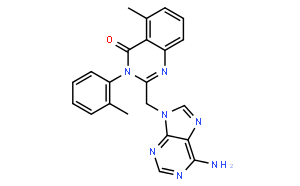| In vitro |
IC-87114 selectively inhibits PI3Kδ and not sensitive to PI3Kα, β, and γ. In human neutrophils, IC87114 (5 µM) potently inhibits N-formyl-methionyl-leucyl-phenylalanine (fMLP)-stimulated phosphatidylinositol triphosphate (PIP3) biosynthesis and chemotaxis. IC87114 (5 µM) also inhibits polarized morphology and spreading of neutrophils. [1]
In human acute myeloid leukemia (AML) blast cells, such as bone marrow mononuclear cells (BMMCs), IC87114 (10 µM) inhibits both constitutive and Flt-3-stimulated Akt phosphorylation and cell proliferation. [2] It is also found that IC87114 (5 µM–30 µM) inhibits SCF- or IL-3-stimulated BMMC responses, which are not observed in PI3Kδ mutant (p110δD910A) cells. [3]
In anti-CD3-stimulated mice CD62L+ (naive) and CD62L− (effector/memory) CD4+ T cells, IC87114 inhibits proliferation and interferon-gamma (IFN-γ) production. The IC50 values of IC87114 are: (1) 1.2 µM and 40 nM, for CD62L+ and CD62L− cell proliferation, respectively; (2) 120 nM and 1 nM, for IFN-γ production of CD62L+ and CD62L− cells, respectively. Similar effects by IC87114 are also observed in human T cells. [4]
A recent study reveals that in chromaffin cells, IC87114 enhances the transient increase of PtdIns(4,5)P2, which results in a potentiation of exocytosis. [5]
|
| In vivo |
In mice, IC87114 (15 mg/kg–60 mg/kg) inhibits the allergic response in the back skin and ear. [3]
In mice induced with anti-CD3 or ConA, IC87114 (30 mg/kg) reduces hypersensitivity responses and decreases plasma levels of cytokines, such as IL-2, IL-4, IL-17, IFN-γ, and tumor necrosis factor-α (TNF-α). [4]
|

 COA
COA MSDS
MSDS HPLC
HPLC NMR
NMR